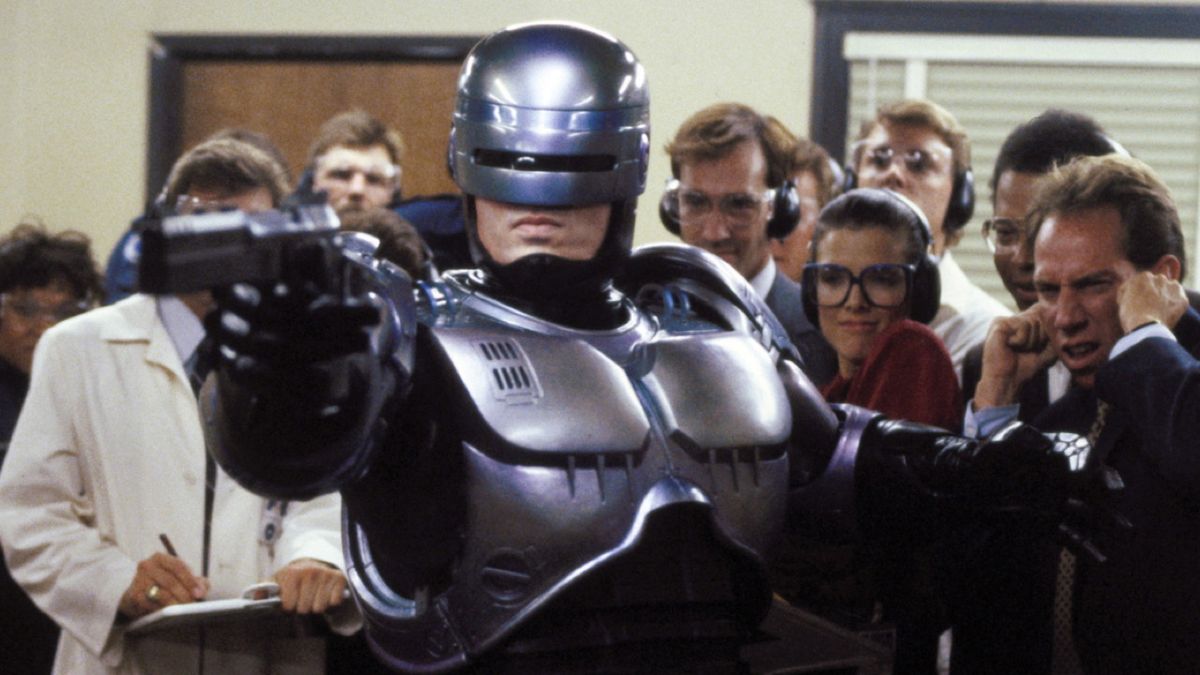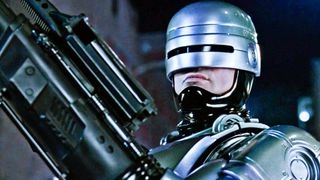We never needed the RoboCop remake. 30 years later, the original has only become more relevant
Happy 30th birthday, RoboCop. You're as relevant now as you've ever been...

We never needed 2014’s RoboCop remake, and I say that not just for the traditional, nostalgia-tinged reasons you might expect. The remake’s redundancy isn’t just about standard-issue aversion to do-overs of much-beloved, classic movies, though of course - like many others who watched the original on a fuzzy VHS cassette when technically far, far too young - I felt an instinctive, natural aversion the idea of reimagining the moment it was announced. No, the real reason we never needed another RoboCop is simply that Paul Verhoeven’s 1987 cyberpunk masterpiece is far more than bombastic, bloody, robot-on-robot action. It’s a razor-sharp, laser-hot, socio-political satire of the highest order, and now - 30 years later - still one of the most convincing and entirely relevant near-future nightmares in the medium.
It should have dated by now, of course. Being equal parts sci-fi and satire, RoboCop should, in retrospect, be a prime candidate for of-its-time tweeness. There’s nothing more lovably kitsch than a naïve view of the future, made in the past. Set that future not too far away from the work’s original release date, and you’re usually investing in a guaranteed hit of fast-fading futurism. But there’s nothing kitsch about RoboCop. It might often be cited as the most quintessentially ‘80s action movie, thanks to its blunt, no-nonsense tone and (deliberately) excessive violence, but such appraisals are superficial. Really dig into RoboCop, into all the important details in between the coke-snorting, car busting, limb exploding stand-outs, and you’ll find that its heart belongs as much to the present day as it ever did its point of historical origin.

The reasons RoboCop remains so utterly relevant are part happy accident, part clever design. Most obviously, the main issues the movie’s core plot skewers – the increasing corporatisation of day-to-day, civilian life, and the dehumanising effect of the for-profit takeover of social services – are even more relevant now than they were in the ‘80s. Back in ’87, as rising corporate greed culture and spreading urban decay were setting the stage for a major divide between rich and poor, the scenario posited by RoboCop was a tangibly scary ‘What if?’. In 2017, we’re waist-deep in the reality, with private interests nibbling at healthcare, policing, and military action on both sides of the pond, and politically motivated media attempting a self-interested stranglehold of the public’s world-view. Clearly, director Verhoeven and writers Edward Neumeier and Michael Miner were storytelling with a prescience verging on the clairvoyant. ‘80s fashions and 4:3 TVs aside, RoboCop could have been written last year and it would still feel modern.
Still alive, still kicking
But RoboCop remains relevant beyond its core narrative. Thinking of the movie today, it’s impossible not to quickly visualise the many hilarious, cheerfully doom-laded Media Break news segments and extravagantly garish TV ads for fictional products. Although now an inseparable part of the film’s DNA, these sequences were actually added late in production as an attempt to distract censors from the movie’s violence – RoboCop received multiple X-ratings before finally being bestowed with an R. But the upshot is that they allow the movie to cast its net wider, telling a cautionary story not just of economic influence vs. personal freedom, but also - in a more ambient way - about the many knock-on effects of crass commercialism and selfish, thoughtless consumerism.

A mechanical sports-heart can be bought if you can afford it. Orbital military lasers toast innocent civilians during ‘whoopsie’ accidental firings. Family game night has escalated, with aggressive competition and a growing desensitisation to the cheery, vapid world news resulting in a climate where angrily nuking one’s siblings is just fine. The cumulative effect is a film that doesn’t just point the finger at corporate bogeymen, but which quietly hacks into all the ways in which the wider establishment, and the consumers themselves, facilitates social erosion. RoboCop himself might have only a couple of key enemies to vanquish – though it’s notable that as a corrupt CEO and a violent street criminal, they encompass both ends of the decay spectrum, effectively representing both initial cause and ultimate effect – but the movie itself has a much more holistic spread of targets.
Such talk of the human factor though, must lead us on to RoboCop’s most potent, slow-burning fuel. Because the film’s sly focus on humanity and human nature is the real key to its ongoing vitality. Its conceits and themes are built not upon the ideas and concerns of a particular place and time, but rather universal truths that haven’t changed in centuries, let alone the last few decades. It might no longer be 1987, but people are still the same. RoboCop’s surprisingly warm, surprisingly well-observed storytelling is the product of setting up a broad-strokes world and then letting real humanity fill the gaps. And when you do that, the fundamentals of your tale will always remain true.

RoboCop has a resounding truth whether looking at its good guys or villains. There’s a whole film (perhaps even a long-running TV series) to be had in focusing on the exasperated, put-upon, but determined cops of the front-line of the Detroit police department. These looks behind the scenes, at both day-to-day business and the personal tensions between ‘real’ policing and OCP’s cybernetic revolution, always ground the film with a weary, struggling reality that no amount of robot tanks or splattered toxic goons can reduce. In fact, the film’s cartoonier excesses elsewhere make the human side all the more resonant and believable by contrast.
Sign up to the SFX Newsletter
Get sneak previews, exclusive competitions and details of special events each month!
Faceless corporations
And then there’s Omni Consumer Products itself. The faceless, unfeeling corporation at the centre of the story, in truth it’s anything but. Each of the (many) looks we get behind its walls - into its boardrooms, its corridors, and its hushed bathrooms, murmuring with ambitious snark and conspiracy – tells another story of personal desperation, morally-bankrupt avarice, and a ceaseless hunger for self-promoting success. OCP as a collective entity might (in many ways) be the instigating villain of the piece, but it is made up of a great many individuals whose motivations derive from the same, dehumanising consumption afflicting those outside.

These amoral suits might be out and out scumbags, wrecking lives for profit without a second thought, but by allowing us the time to understand some of their individual places in the pecking order, and the personal goals whirring within the main plot, RoboCop can and does say far more. It never makes them sympathetic, but it does make them, and the world that spawned them, easier to understand. In some ways perhaps they’re victims themselves, at the very least to themselves.
If there’s one image that always sticks with me after a viewing of RoboCop, it’s the uncontrolled, gleeful response of lowly junior executive Johnson as (literally) outgoing boss Dick Jones is launched through the board room window at the film’s climax. Long the lapdog on the periphery of the big conversations, he might have just witnessed the brutal death of his superior, but he’s also seen an opportunity. The wheels are turning again, and while OCP’s current plan might have failed, he and many others have dodged the blame, and are free to try again, again and again, while advancing their own positions in the process. The years go on, but people really don’t change much at all.
At this point it almost goes without saying that RoboCop’s central metaphor is that of an honest, incorruptible man battling to regain his humanity after being forced to become part of a literal corporate machine. It shouldn’t be ignored, mind. With all the many layers and facets at play in Robocop’s deftly detailed world, it’s easy to skip the blunter, more straightforward theme at its centre as almost a token gesture. But played so well, with such genuine sympathy, concern, and uncertainty between Peter Weller’s Murphy and Nancy Allen’s Lewis (Weller was cast for his ability to emote using only his chin, and it shows), the core protagonist journey is as potent as anything else in the movie, working as both affecting character drama and an extra, resonant layer of meaning.

So no, we didn’t need the 2014 RoboCop remake. There’s simply nothing it does – nothing it could do – that the original movie doesn’t do perfectly, completely, and with undiminished relevance, 30 years later. In fact, if anything, the remake’s inevitably watered-down nature (hard edges filed off, satirical teeth blunted, new opportunities missed), only makes the first film’s importance and foresight even more apparent. And it’s not a simple matter of direct quality comparison. Because by making RoboCop more user-friendly, less witty, and entirely less offensive, the cleaner, shiner, 2014 edition ultimately became just another product of the profit-focused, production-line world Verhoeven’s movie foresaw in the first place.
And in a round about way, there can be no more fitting tribute than that.
Most Popular

